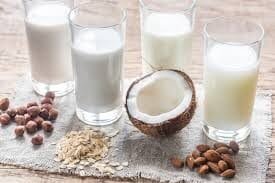Dairy-Free Diet: Exploring Options and Embracing Alternatives
The dairy-free diet excludes all or most dairy products, encompassing milk, cheese, yogurt, butter, and any food containing them. While initially driven by lactose intolerance or milk allergy, this dietary choice has gained wider adoption for various reasons, prompting exploration of its benefits and alternative food options.
Why Go Dairy-Free?
Several factors contribute to the popularity of the dairy-free lifestyle:
- Lactose Intolerance: This digestive condition arises from the body’s inability to digest lactose, a sugar found in milk. Eliminating dairy alleviates symptoms like bloating, gas, and diarrhea.
- Milk Allergy: A true allergy to milk protein triggers an immune response, requiring strict avoidance of dairy products to prevent allergic reactions.
- Ethical and Environmental Concerns: Some individuals choose a dairy-free lifestyle due to concerns about animal welfare in dairy farming practices or the environmental impact of dairy production.
- Potential Health Benefits: While research is ongoing, some studies suggest potential benefits of a dairy-free diet for managing certain conditions like acne or reducing inflammation.
Embracing a Dairy-Free Lifestyle:
Transitioning to a dairy-free diet doesn’t have to mean sacrificing essential nutrients. Here are some readily available substitutes to maintain a balanced and healthy diet:
- Calcium: Dairy is often a primary source of calcium, but numerous plant-based alternatives are rich in this mineral. Explore options like calcium-fortified plant-based milks (soy, almond, oat), leafy greens (kale, collard greens), broccoli, and fortified tofu.
- Protein: Dairy products like yogurt and cheese can contribute protein intake. Fortunately, a variety of plant-based options provide excellent protein sources, including beans, lentils, legumes, nuts, seeds, and whole grains like quinoa and tempeh.
- Vitamin D: Similar to calcium, vitamin D is often associated with dairy. Look for fortified plant-based milks enriched with vitamin D, or consider including fatty fish like salmon, sardines, and tuna in your diet. These fish are naturally rich in vitamin D.
Food Options to replace dairy based food for a Thriving Dairy-Free Life:
The world of dairy-free living is abundant with delicious and nutritious options. Here’s a glimpse into some readily available food groups you can explore:
- Fruits and Vegetables: A vibrant mix of fruits and vegetables forms the foundation of a healthy diet, and they are naturally dairy-free. Embrace the diverse flavors and nutritional benefits they offer.
- Plant-Based Milks: From soy and almond milk to oat and coconut milk, numerous dairy-free milk alternatives provide beverage options for cereal, smoothies, and even baking.
- Plant-Based Yogurts: Coconut-based yogurts and soy-based yogurts offer creamy and delicious alternatives to traditional yogurt, often available in various flavors.
- Dairy-Free Cheeses: Made from nuts, soy, or even coconut, an array of dairy-free cheeses cater to cheese lovers, offering options for snacking, cooking, and even pizza toppings.
- Meat, Poultry, and Seafood: These naturally dairy-free protein sources can be incorporated into your diet as per your preferences and dietary needs.
Remember:
A dairy-free diet can be a healthy and fulfilling way of life. Consulting a healthcare professional or registered dietitian can help ensure your individual needs are met and you’re receiving essential nutrients through alternative food sources. With careful planning and exploration, you can navigate the world of dairy-free options and create a delicious and nutritious path to a healthier you.
Thanks for visiting Gymbag4u.com
You may also love reading our following articles. Are You Eating Enough Protein? Understanding the Importance of Protein in Your Diet – GymBag4U and Top 20 Calcium-Rich Foods to Enhance Your Daily Diet – GymBag4U and Combining the Mediterranean diet with physical activity may prevent hospitalization-related disability in older adults. – GymBag4U
